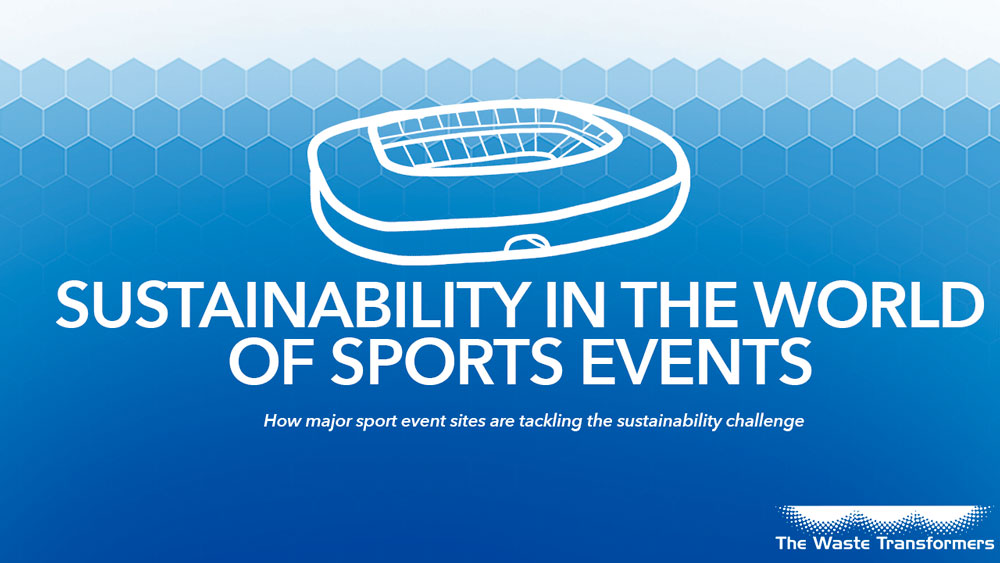The world we are living in is something completely different from what it looked like 20 years ago. It has been a hectic era of radical economic, societal and environmental change. However, some core values will never change. Sport has always been seen as a means for unity, solidarity and equality, but it comes at an environmental cost. How can large sports and event venues turn this environmental burden and become climate positive inspiring their fans?
Singing crowds. Air filled with joy. That is what comes to mind when people think at sports event. What, on the other hand, is overlooked is the enormous impact that these large sports events are organized and run. In these occasions an enormous amount of resources is needed, causing both financial and environmental damages to the different parties involved. Managing these resources in a more efficient circular way will have a positive impact, both in the short and long term, such as:
1. Finding alternative energy sources allow a larger degree of independence 2. Reducing and transforming (food) waste will result in a financial saving and a lower environmental impact; 3. Using sustainable materials and processes will reduce indirect emissions, ideally allowing for later re-use of materials.
More in detail, here are listed five benefits of creating sustainable sports venues for a cleaner environment:
Water conservation:

Commonly referred to as the “Blue Gold”, due to its importance and scarcity, fresh water is an extremely precious resource. The steady growth in terms of global population will require a better management of our fresh water sources, as well as a sensible reduction in the usage. Stadiums use lots of water irrigating, preparing the natural grass fields for the game and cleaning the area after visitors attended the event. Besides water reduction measures, rainwater harvest reduces the pressure on fresh water supplies. For the FIFA World Cup 2022, Qatar has been putting policies in place to improve water usage efficiency, lower consumption per-person, and maximize the reuse of treated sewage and industrial water. Qatar hopes to achieve 70% wastewater reuse in national projects after reusing 50% of its treated wastewater in landscaping and agriculture. In order to accommodate the high number of people anticipated to be in Qatar during the world event, Qatar invests in infrastructure to increase its water supply by the construction of large reservoirs for the storage of drinkable water.
Food Waste:
According to a FAO report, 1/3 of the food that is produced globally ends up being wasted. This means that all the resources that have been used to create this food are wasted in the process: just think that 25% of the world’s freshwater supply is used to grow food that ends up wasted. Large events usually provide a food choice to attendance, which is often overestimated and results in a large amount of food waste produced. How to cope with that problem? Different approaches appear to be successful: for example, at the Guaranteed Rate Field (home of the Chicago White Sox baseball team), the food buffet has been substituted by an order-based food offer, to manage surplus food production and reduce waste.
Casestudy Johan Cruijff ArenA: #EATPLAYTRANSFORM Largest Dutch Football stadium: 2019 2.3 million visitors Capacity 55.000 people Will run a Waste Transformer anaerobic digester next to the stadium, transforming food waste. Value streams created: Biogas turned into electricity and cooling for the data center. Social jobs created for people with a distance to the labour market, to collect waste and feed the Waste Transformer. The nutrients in the food waste are turned into a natural liquid fertilizer, being tested to replace artificial fertilizer.
Energy dependence reduction:

Large sports events and festivals are still heavily reliant on fossil-based energy sources. There is a gradual shift towards sustainable energy sourcing (biofuels, anaerobic digestion, solar panels, and wind turbines). In an effort to use less energy, more and more stadiums are being built with energy-producing solutions, including solar and wind power installations that provide them access to a backup energy supply. The Johan Cruijff ArenA in Amsterdam is a prime example: in 2018, they installed a flexible energy storage system made up of Nissan Leaf batteries co-powered by 4,200 rooftop solar panels. Three megawatts of power can be stored in the system, which is sufficient to power thousands of homes. By smoothing the peaks in energy demand that occur during concerts, the energy storage system relieves the pressure on the energy grid and offer backup power, minimizing the need for diesel generators. In 2023 additional green energy is produced by an on-site containerized Waste Transformer, transforming food waste from the stadium and nearby office buildings into electricity and cooling from the biogas generated.
Reduced emissions:

Think about world-famous sports events, such as the FIFA World Cup or the Olympic Games, and their huge impact on the environment: according to official numbers, South Africa’s and Brazil’s World Cup tournaments (2010 and 2014) combined generated 5.6 million tons of CO2e (carbon dioxide equivalent). If you include 2016 Rio de Janeiro’s Olympic Games, a total of 10.1 million tons of CO2e has been emitted: comparable to burning 11 billion pounds of coal. Recently, on the other hand, a growing number of stadiums are constructed from better-for-the-environment, recyclable materials including wood and re-used shipping containers. The implementation will positively impact pollution reductions, resulting in a lower quantity of emissions all around the event industry.
Financial advantages:
When maintenance and operation costs for the stadiums are taken into account, environmentally supporting technical solutions will wind up being less expensive in the long term; the project’s value may rise over time while the price of water, energy, upkeep, and insurance premiums may fall. Furthermore, the opportunity to upcycle materials (such as sunlight, food waste and rainwater) into valuable resources (energy, heat and usable water) can represent a saving for businesses embracing circular economy guidelines. To add on that, supporters are growingly interested and focused on sustainable behaviour: companies embracing positive change may influence people’s decision to attend events which are run following solid principles, compared to others that don’t have sustainability as a priority. To sum up, a sustainable organizational mindset creates a solid, long-lasting trust bond between companies and supporters.
As you can see, there are several initiatives and ways to make the event industry more sustainable and greener. Some progress has been made, but the road to fully sustainable events is still very long and intricate in front of us. Companies should use their audience and position to absorb and advertise positive behaviour, by using sustainable processes and partnering with green pioneers. Nevertheless, everyone of us can have an impact with their choices and their behaviours.
To win this “game”, all together, we must act as a team.
Bio The Waste Transformers:
The Waste Transformers are the developers for on-site containerized anaerobic digesters, called Waste Transformers. With their food waste solution, they won the Reimagine Football Competition in 2022 organized by UEFA. Their Waste Transformers support numerous industries, including the hospitality industry, to allow hotels to turn their own food waste into green electricity, heat and organic fertilizer to use directly on-site. This enables hotels and other businesses to stop sending valuable food waste to landfill, reduce energy bills by generating their own energy and eliminate food waste collection costs. They are active on a global scale, offering modular Waste Transformers allowing to transform from 300kg of food waste per day. https://www.thewastetransformers.com
For enquiries or contact:
Coen Bakker, Marketing Manager marketing@thewastetransformers.com
Do you want to follow us on social media? Give us a page like on Facebook, Twitter, LinkedIn and Instagram.
Become a frontrunner in your industry

Hotels

Airports

Universities

Communities

More industries
Get in contact with us to learn more about the possibilities of using an installation on your site to generate value from waste.
> Return to other news



